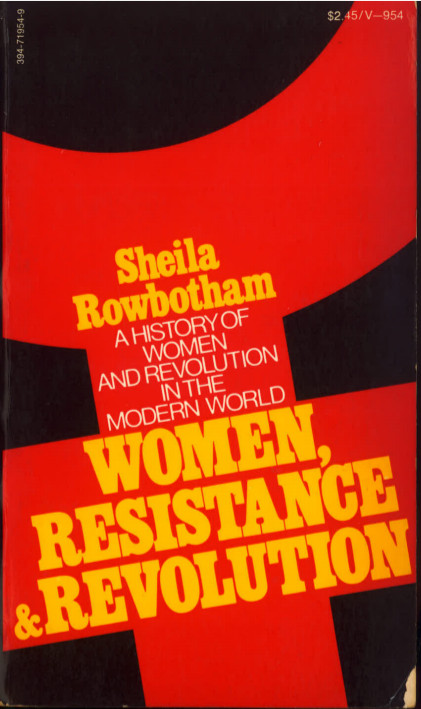David Graeber: Inside Occupy (2012) [German]
Filed under book | Tags: · activism, debt, history, occupy movement, politics, protest, revolution

“Occupy Wall Street!” Mit diesem Aufruf besetzt im September 2011 eine Gruppe von Aktivisten den Zuccotti-Park im New Yorker Finanzdistrikt. Sie wollen friedlich gegen die Finanzmärkte und Banken, die ungerechte Verteilung der Vermögen sowie die Untätigkeit der Politik demonstrieren. Was steckt hinter dieser Bewegung, die in kurzer Zeit Millionen Menschen rund um den Globus mobilisiert? Was steckt hinter den Guy-Fawkes-Masken der Besetzer? Was steckt hinter ihrem Mut und ihrem Zorn? Der Vordenker und Aktivist David Graeber berichtet aus erster Hand, wie alles begann, wie die Bewegung stark werden konnte und warum dies erst der Anfang ist.
Translated by Bernhard Schmid
Publisher Campus Verlag, Frankfur/New York, 2012
ISBN 3593397196, 9783593397191
200 pages
PDF (includes Revolution Guide, 28pp)
Comment (0)Sheila Rowbotham: Women, Resistance and Revolution: A History of Women and Revolution in the Modern World (1972)
Filed under book | Tags: · activism, feminism, history, politics, protest, resistance, revolution, social movements, socialism, women

“This is the first narrative history of feminism. Sheila Rowbotham, a young social historian, explores the relationship between feminism and social revolution, and the varied historical forms that the attempt to change the position of women has taken in the West and in revolutionary countries like China, the U.S.S.R., Cuba, Algeria, and Vietnam.” (from the back cover)
Originally published by Allen Lane The Penguin Press, London, 1972
This edition published by Vintage Books, a division of Random House, New York, January 1974
ISBN 0394719549
288 pages
PDF (no OCR)
Comment (0)Raoul Vaneigem: The Revolution Of Everyday Life (1967–) [FR, ES, EN]
Filed under book | Tags: · alienation, bourgeoisie, consciousness, everyday, labour, life, nihilism, power, proletariat, revolution, situationists, spectacle, things, transcendence

“The book was, along with Guy Debord’s The Society of the Spectacle, one of the most significant works written by members of the Situationist International (1957–1972).
The book takes the field of ‘everyday life’ as the ground upon which communication and participation can occur, or, as is more commonly the case, be perverted and abstracted into pseudo-forms. The author considers that direct, unmediated communication between ‘qualitative subjects’ is the ‘end’ to which human history tends – a state of affairs still frustrated by the perpetuation of capitalist modes of relation and to be “called forward” through the construction of situations. Under these prevailing conditions, people are still manipulated as docile ‘objects’ and without the ‘qualititive richness’ which comes from asserting their irreducible individuality – it is toward creating life lived in the first person that situations must be ‘built’. So to speak, it is the humiliation of being but a ‘thing’ for others that is responsible for all the ills Vaneigem equates with modern city life – isolation, humiliation, mis-communication – and toward creating new roles that flout stereotyped convention that freedom comes.” (Wikipedia)
French edition
Publisher Gallimard, 1967.
Vaneigem’s preface to the first French paperback edition was published by Gallimard in 1992.
English translation was first published in 1983 jointly by Left Bank Books and Rebel Press.
Translated by Donald Nicholson-Smith
Publisher Rebel Press, 2001
No copyright claims will be made against publishers of non-profit editions.
ISBN 0946061017, 9780946061013
279 pages
Review: Libero Andreotti (J Architectural Education, 1996).
Traité de savoir-vivre à l’usage des jeunes générations (French, 1967, unpaginated), HTML
Tratado del saber vivir para uso de las jovenes generaciones (Spanish, trans. Javier Urcanibia, 1977/2008)
The Revolution Of Everyday Life (English, trans. Donald Nicholson-Smith, 1983/2001)

